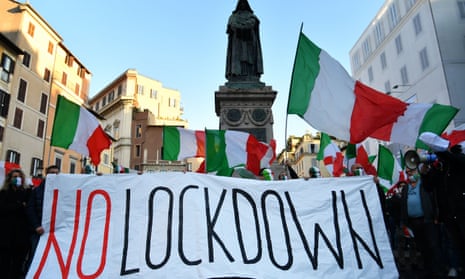Fresh lockdowns to stem the spread of coronavirus have sparked sometimes violent protests in several European countries, fuelled both by ideological fury at new government-imposed restrictions and fears of economic hardship.
As the number of infections surge and hospitals and intensive care units fill up, countries including Austria, Belgium, France, Germany, Italy, the Netherlands and Spain have once more introduced tough curbs on movement and gatherings.
But the measures are stirring resistance, not just among libertarians who see them as an assault on personal freedom and conspiracy theorists who say the virus is a hoax, but from business owners and independent workers worried for their future.
The protests suggest mounting dissatisfaction with governments’ responses to the pandemic and, amid a growing realisation that it will last for some time yet, alarm at the economic consequences even in countries such as Germany and France, where generous economic safety nets are functioning relatively well.
Italy, one of the hardest-hit EU countries this spring, has been the scene of violent protests for more than a week as the government brought in new measures including closing cinemas and theatres and ordering bars and restaurants to shut at 6pm.
There have been skirmishes between police and protesters in Florence and other cities, including Rome, Naples, Turin and Bologna, with clashes between riot officers firing teargas and demonstrators hurling Molotov cocktails, bottles and rocks and overturning bins.
The government is working towards yet tougher measures that could include a national 9pm curfew, a ban on inter-regional travel and the closure of shopping malls at weekends to try to slow an alarming rise in daily infections.
The interior minister, Luciana Lamorgese, said this weekend the protests involved “violent fringe elements” including football hooligans, far-right activists and neo-fascists trying to “exploit the social and economic discomfort of this difficult moment”.
But while polls show a majority of Italians support the latest restrictions, and the government has promised €5bn for the worst-hit professions including restaurants, taxi drivers and entertainment venues, peaceful protests by small business owners have also multiplied across the country.
Slogans brandished by demonstrators have included “Work is our right” and “If you close us down, you pay up.” Government compensation “doesn’t always arrive”, a Milan businessman told Agence France-Presse, and is “obviously not enough for the many who work wholly or partly in the informal economy. The winter will be hard.”

In Spain, which has has imposed a nationwide night-time curfew and implemented regional border closures, anger spilled on to the streets on Saturday for the second night running, with looting and vandalism breaking out in some cities.
Thirty-two people were arrested and 12 injured in Madrid after a protest over the region’s midnight to 6am curfew turned violent, and there were also demonstrations over the weekend in Barcelona, Málaga, Vitoria, Valencia, Santander and Burgos.
The prime minister, Pedro Sánchez, called for an end to “violent and irrational behaviour” by a minority. The protests have involved far-left and far-right groups, with the leader of the far-right Vox party, Santiago Abascal, saying there were “more reasons than ever to protest against this government, which is ruining us”.
Police in Belgium, which announced a second lockdown on Friday, broke up an unauthorised anti-lockdown protest in Brussels a few days earlier, while in Berlin, a crowd of about 2,000 including far-right activists and anti-vaxxers joined a rally last Monday demanding an end to all coronavirus restrictions.
“We are here and we are loud because we are being robbed of our freedom,” the marchers chanted. The same day, an attempted arson attack was reported against the national disease control and prevention agency, the Robert Koch Institute, while on Wednesday thousands of artists and entertainment workers demanded more support.
The chancellor, Angela Merkel, announcing a new “soft lockdown” from Monday with bars, cinemas and theatres closed and cafes and restaurants allowed only takeaway service from Monday, described people arguing Covid-19 as dangerous and irresponsible, but said the government expected to face similar “protests and, let’s say … incomprehension” for some time to come.
In France, which has also entered a second, more relaxed lockdown, small protests numbering no more than 100 or so marked the occasion on Thursday night in several cities including Paris and Toulouse. In Castres, about 80km east of Toulouse, local shopkeepers brandished a banner reading: “Upright today; on our knees tomorrow”.

Shopkeepers have complained about being forced to close while supermarkets, because they also sell food, are allowed to sell “non-essential goods” such as shoes, clothes and beauty products.
In a gesture of appeasement, the French finance minister, Bruno Le Maire, said on Monday that supermarkets would face the same limits on selling non-essential goods, but insisted shop owners may not challenge the lockdown rules.
Officials have said European economies, already devastated by lockdowns in March, April and May, will take a further hit from the second series of closures, even though the new measures are mostly not as strict and many companies are better equipped to deal with them.
Le Maire said last week he expected France’s economic activity to fall by 15% during the new lockdown, about half the downturn it suffered this spring. But economists have warned consumer behaviour in particular is likely to be dampened by the fear of further lockdowns before life returns to normal sometime next year.
